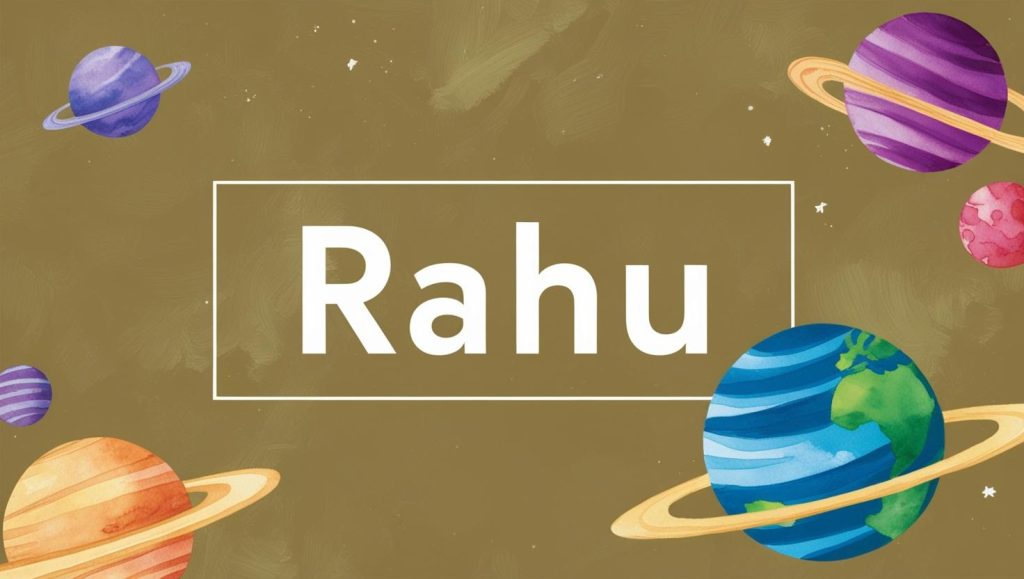The seventh house in Vedic astrology governs marriage, partnerships, business alliances, contracts, and public relationships. It reflects how we engage with others in committed, one-on-one relationships. The seventh house is directly opposite the first house, which represents the self. Thus, this house represents “the other”—what we seek in another person, how we relate, and what we project onto our partners.
When Rahu, the shadowy north node of the Moon, is placed in the seventh house, it creates an intense, karmic focus on relationships, especially romantic and marital unions. The person may be deeply drawn to partnerships, yet also experience confusion, dissatisfaction, or obsession in them. Rahu magnifies desire—and here, it becomes the desire for love, recognition through others, and the illusion of the perfect companion.

Rahu’s Desire for the Ideal Relationship
Rahu in the seventh house makes the native desperately hungry for partnership. They often feel incomplete without a companion or continually seek “the one” who will bring meaning, excitement, or fulfillment into their life. This desire stems not from emotional need alone, but from deep karmic patterns.
In many cases, the individual may marry early, out of obsession or infatuation. Others may delay marriage in pursuit of an ideal that never seems to manifest. Regardless of timing, there is a theme of restlessness, confusion, or excess longing surrounding love and marriage.
Rahu clouds judgment. The person may not see their partner clearly, projecting unrealistic expectations onto them. Over time, they are forced to re-evaluate what partnership truly means.
Attraction to Foreign, Unconventional, or Powerful Partners
One of Rahu’s unique traits is its link to the foreign and unconventional. In the seventh house, it often draws the person toward partners who are different—by culture, status, language, or personality. There may be fascination with someone from a different country, caste, or even a background that is considered taboo or unusual.
Sometimes the partner is highly successful, influential, or eccentric. Other times, the partner may bring challenges—emotional instability, secrets, or karmic baggage. Regardless, the relationship tends to be intense, transformative, and deeply karmic.
These partnerships are not random—they serve as mirrors, forcing the person to confront parts of themselves they were unaware of.
Relationship Confusion and Emotional Turbulence
Rahu creates illusion. In the seventh house, this often leads to confusion, dissatisfaction, or chaos in partnerships. The native may idealize the person at first, only to discover flaws later. Emotional highs are followed by sudden lows. Breakups, betrayals, or unhealthy dependencies may occur, especially if boundaries are weak.
There may also be a tendency to become overly dependent on the partner for validation, identity, or emotional strength. But Rahu eventually forces the native to reclaim their own power and not rely on others for self-worth.
These experiences are meant to push the native toward a more balanced, mature understanding of love—one rooted not in fantasy, but in conscious companionship.
Business Partnerships and Public Alliances
The seventh house also governs business collaborations and legal contracts. Rahu here brings both opportunity and unpredictability. The native may attract powerful allies or find success in joint ventures, especially with foreign clients or through unusual channels.
However, trust issues may arise. Contracts may carry hidden clauses, or business partners may turn unreliable. The native must practice caution, clarity, and due diligence when forming legal or financial alliances.
Success is often possible, but only when partnerships are built on transparency and aligned values, not just charisma or outward status.
The Illusion of the Perfect Spouse
Rahu in this house often brings a deeply ingrained belief in a soulmate, an ideal partner, or a romantic savior. This belief drives much of the person’s behavior in love—they chase, cling, and crave. But each time, Rahu reveals the truth: perfection does not exist.
The soul must learn that no one can complete them. Love is not about finding someone flawless, but about accepting another human being with all their imperfections—and doing the same for oneself.
This shift is often painful but ultimately liberating. The person grows from depending on a relationship to thriving within one.
Public Image, Social Approval, and Relationship Status
This placement may also indicate a person who is very concerned about how their relationship appears to others. Marriage or public partnership becomes a status symbol—something to flaunt, maintain, or upgrade, sometimes at the cost of inner peace.
They may remain in a toxic relationship because it looks perfect on the outside, or constantly change partners in search of a better social image. Rahu here feeds the desire to be admired through association.
Only when the person lets go of this superficial lens can they form partnerships based on authentic connection rather than external perception.
Karmic Lessons and Growth Through Relationships
Rahu in the seventh house points to unfinished karma in relationships. In past lives, the native may have avoided commitment, misused power in partnerships, or been overly isolated. In this life, the soul is called to experience relationships fully—to engage, feel, and evolve.
Every romantic or business relationship becomes a classroom. Each partner reflects a lesson—some through joy, others through heartbreak. These experiences gradually dissolve illusions and build emotional maturity, self-awareness, and relational wisdom.
Ultimately, the goal is not just to find a partner—but to learn how to partner well, with empathy, presence, and purpose.
Final Thoughts
Rahu in the seventh house is a placement of deep karmic yearning for connection, balance, and recognition through others. It creates a magnetic pull toward relationships but also challenges the native to break through illusion, dependency, and unmet expectations.
With awareness, this placement transforms from obsessive longing to conscious love. The native learns to relate with clarity, choose partners with wisdom, and experience relationships not as a need—but as a sacred sharing of life’s journey.
